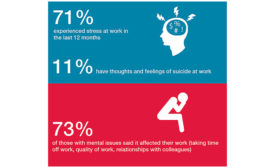Home » Keywords: » employee well-being
Items Tagged with 'employee well-being'
ARTICLES
Everyone needs to work together
Read More
Overworked and underappreciated
How businesses can protect their employees from burnout
July 9, 2020
Training
The good, the bad and the ugly of workplace programs
To incentivize or not?
June 5, 2020
Digital Exclusive
Mental Health Focus: 5 Effective Steps to take in the workplace
May 13, 2020
Digital Edition Exclusive
For Your Health & Wellness: Coping with pain
11 alternatives to meds
January 1, 2020
Digital Edition Exclusive
Department of Labor issues Mental Health Toolkit
Creating a workplace culture for employees facing mental health issues
November 5, 2019
Digital Edition Exclusive
For Your Health & Wellness: Catching a quick nap is smart business
October 2, 2019
Get our new eMagazine delivered to your inbox every month.
Stay in the know on the latest safety trends.
SUBSCRIBE TODAYCopyright ©2024. All Rights Reserved BNP Media.
Design, CMS, Hosting & Web Development :: ePublishing











